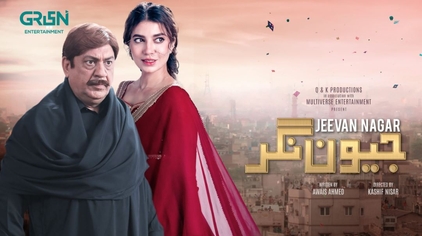In the fictitious town of Jeevan Nagar, Babbar Shah and his lackeys were the law of the land, the ones to approach for any problem and the ones to label others “a problem.” But when an assassination attempt on Babbar Shah is carried out, replacing Babbar Shah with the look-alike Laali Begum, what will happen to this peaceful town? Babbar Shah is a character that made such an impression on audiences that his death left viewers wondering…..now what? The narrative took a dark turn, only growing darker with each episode as Billay, Raja Palastar and their allies wreaked havoc on Jeevan Nagar, introducing youths to drugs, rendering the town-folk homeless, turning the town-folk against one another and much more. In the final episodes, “Jeevan Nagar” is unrecognizable and miserable – and we, the audience, slowly realize that Jeevan Nagar isn’t simply a town – it’s a symbol. “Jeevan Nagar” stars Sohail Ahmed, Rabia Butt, Noor Ul Hassan, Kashif Mehmood, Atif Syed, Saqib Sameer, Khalid Butt, Tahira Imam, Kinza Malik, Amna Malick and others. The story has been written by Awais Ahmed and directed by Kashif Nisar.
In the finale, Neelo (Saqib Sameer) and Amma Haajan take Laali Begum/Babbar Shah (Sohail Ahmed) to task, really emphasizing reality and what he has done to Jeevan Nagar. The gloves are off and with Jeevan Nagar protesting outside his home, those who love him are no longer scared to tell him exactly what he needs to hear – he has broken all the promises he made to protect Jeevan Nagar. Meanwhile, Munni (Rabia Butt) and all the residents of Jeevan Nagar are peacefully protesting against Babbar Shah and it’s in the middle of this protest that Baggay and Babu, Babbar Shah’s most loyal followers, drag Laali Begum out and force her to confess to her duplicity. In the end, Jeevan Nagar’s residents come together to make their town a welcoming, loving place of support and friendship, no longer led by divisive forces to lead them astray.
“Jeevan Nagar” can be a representation for many things, but the first thing to come to mind is simply…..Pakistan. Jeevan Nagar, as a town, represents Pakistan and how forces both within the country and outside the country have conspired against Pakistan’s residents, turning citizens against one another in the name of political parties, religion and culture, ensuring the poor remain poor while the rich grow richer and creating unrest. When will Pakistanis stand up and take control themselves to make Pakistan a peaceful nation? Of course, many have also seen Jeevan Nagar as a story against colonialism, Jeevan Nagar representing the subcontinent and how it was ripped apart by foreign powers – and unrest continues today due to their actions. Either way, the story “Jeevan Nagar” told is one of importance, one that inspires thought and discussion – and isn’t that the best sort of show?
There are negatives, of course. First, Laali Begum’s lack of accountability is uncalled for. It’s Laali’s shoulders on which the entire plan was executed, a plan she was well aware of and agreed to. The town folk are not accountable for her actions and what Jeevan Nagar has become. They are the victims and while Laali did so under duress, that was still the choice she made – and had no right, in the end, to feign innocence and pretend as though she had been wronged by the town folk. While the speech she made may have been good, it seemed illogical coming from her mouth. The protest scenes are also shot in a way that’s almost comical with the big protest only focused on a small group of people. But this is just nitpicking at a show that has been a quality product.
The greatest positives of “Jeevan Nagar” are the performances. Sohail Ahmed has been the heart and soul of the show as Babbar Shah and Laali Begum. While we felt grief for Babbar Shah’s loss, Sohail Ahmed’s performance as Laali Begum kept us coming back. Sohail Ahmed is a brilliant performer and makes each and every role his own – and this one will be remembered. Saqib Sameer as Billay and Neelo is in top form. Again, like Sohail Ahmed, he plays his two characters in such a way that one wouldn’t believe it’s the same actor. In the end, Billay winds up being a pawn of the very man who destroyed his world, turning him against the man who picked up the pieces – and while that’s a stellar twist in the writing, it’s impact is felt through Saqib Sameer’s performance. Of course, we can’t forget Rabia Butt as Munni, the light of Jeevan Nagar, a woman who refuses to bow down or sit down, using her voice for good. Rabia Butt is a talent who deserves so much more. The entire ensemble cast has done an excellent job. “Jeevan Nagar” has not been perfect with much of the middle bulk of episodes seeming aimless and miserable. However, with the final batch of episodes, the meaning behind the story has created newfound appreciation for the message the makers have tried to impart – and successfully so. We need more well-intentioned, intelligent dramas like “Jeevan Nagar.”
